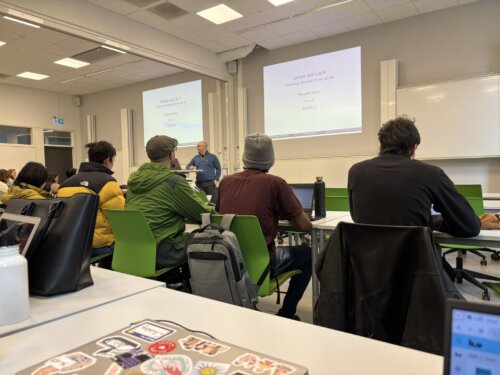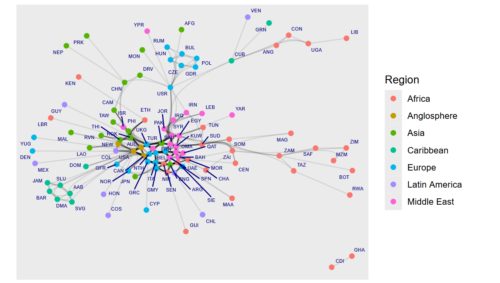March 25, 2025
Computational Social Science? Here’s What We Do!
Hejsan!
This is Clara and I am a first-year student in computational social science (aka CSS). Previously I’ve written about my programme based on my experience in the first semester (click the LINK to check out the post 🌟), and now I’d like to say a little bit more about the programme. If you’re:
- Considering applying for this programme
- Students who have been admitted to this programme
Then keep reading to find out more about CSS!
Overview
The name of the programme might not be very informative, so I’d like to start by giving you an insight into what we do in this programme 😃 Computational social science is a relatively new field of study and at LiU, it belongs to the Institute for Analytical Sociology (IAS). Unlike traditional social sciences, we focus more on quantitative data (compared to qualitative data) and we analyze social phenomena such as voting behavior and the path through which information diffuses in a community. Last but not least, in this programme, we use R as our tool to conduct these analyses.

Curriculum
This is a cross-disciplinary programme, which means we have students from various backgrounds. Thus, the curriculum in the first semester focuses more on theoretical frameworks with mostly lectures, computer labs and seminars, and these will provide solid foundation for the courses in the second semester.
The second semester delves into the practical side with multiple assignments focusing on the employment of statistical models. Linear regression, logistic regression, social network analysis… you name it! The third (which is also the last) semester covers machine learning for social science, organizational & segregation studies as well as ethnic issues on big data. However, the faculty is currently working on reforming the curriculum in the third semester to make the programme better and therefore they might not be exactly the same when you start your study. It is also possible to replace one of the courses in the third semester with either an industry or research internship, as long as it’s approved by the programme director.
What I Have Been Able to Do
So far, I have written two reports that I was allowed to dig into topics that I am interested in, and several others where I got to familiarize myself with those models and practice academic writing. The two reports are in particular helpful for the second semester. In these reports, we need to study a social phenomenon and think about how we will conduct the study in reality, even though we do not really put it into action. This helps a lot in terms of walking me through the process of doing real-world studies as there are many to consider when one wants to study a social phenomenon. In a nutshell, lots of practices that are extremely interesting (though can be stressful sometimes)!
Just to give some examples, for one of the assignments, we used binary logistic models to analyze how people’s opinions affect their choice of political party in an election. The results might not be particularly surprising, but it is really fascinating how we can turn those mathematic equations into models that break down complex human behavior. Another example is social network analysis on disputes between countries. We were given much freedom to choose what to focus on and my teammate and I decided to look into how countries collaborated with each other. It turned out that there were some certain countries that are frequently involved in disputes but never seemed to receive much spotlight on international politics. Isn’t this interesting?

▲ This is an example of what my teammate and I did for one of our assignments.
Comments from Other Students
In addition to my own experience, I interviewed two second-year students, Barbara and Dominik, to give you a more comprehensive view on this programme 🤓
Both of them came from social science backgrounds and Dominik studied computer science as his minor. They both agree that CSS differs greatly from their previous studies, and they have learned a lot in terms of the application of computational methods in social scientific research. There are many who had zero programming experience before joining the programme. As for those who’ve been familiar with programming, it’s relatively new to combine theory and real-world application.
Some of their favorite courses include social network analysis, digital strategies for social science research and machine learning for social science, as all of them demonstrate the possibility of utilizing computational methods to analyze social phenomena that will otherwise be challenging to study.
Besides, not only is the programme well-structured, but the fact that it’s an international master’s programme provides plenty of opportunities for one to learn from the diverse demographics of the class.
Summary
The combination of sociology and computational methodology is what sets CSS apart from many other similar programme. Here you learn both theories and real-world applications. If these sound tempting, then maybe CSS is your next destination 😉
Feel free to leave a comment down below or ask a question if you have any!
Until next time, see you!
_______________________________________________________________
Why don’t continue the conversation with us?
Start with checking out:
Our programmes, the application process, webinars, and our Instagram and Facebook account.
Still left wanting more?
Book an appointment with our recruitment coordinator at infocenter@liu.se.




Great summary of CSS 🥳🥳
Thank you🫶!
CSS Represent!!!